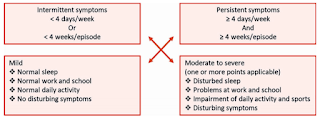Allergic Rhinitis
Introduction
Rhinitis is simply inflammation of the nasal lining, characterized by
- rhinorrhoea
- nasal congestion
- sneezing, and
- itching
Most cases that present in a community pharmacy will be a viral infection or allergic in origin.
Allergic rhinitis is a mucosal reaction in response to allergen exposure.
- The ARIA classification is based on the timing of the symptoms and is divided into intermittent or persistent.
Priming to allergen refers to the phenomenon of increased nasal responsiveness to allergen with repeated allergen exposure.
- Patients, after a period of continuous allergen exposure, may find that they experience the same level of severity in symptoms with lower levels of allergen exposure. Similarly, symptoms will be worse than previously experienced when levels of the allergen are the same.
NOTE: The typical atopy triad is asthma, hay fever and eczema.
Conditions to Eliminate
Infective rhinitis
- Other symptoms such as cough and sore throat are much more prominent.
- Thought to be due to either an overactive parasympathetic nervous system response or hypoactive sympathetic nervous system response to irritants such as dry air, pollutants or strong odours.
- Affecting nearly 10% of women during pregnancy and resolves spontaneously after childbirth.
Management
Before medication is started, it is clearly important to try and identify the causative allergen (e.g. grass pollens, tree pollens, fungal mould spores, cats or dogs fur).
- If this can be achieved, measures to limit exposure to the allergen will be beneficial in reducing the symptoms experienced by the patient.
- Car windows and air vents should be kept closed while driving, allowing car ventilation and air-conditioning units to filter out pollen.
- Regular house cleaning is essential for minimizing exposure to house dust mites.
Sodium chloride 0.9% solution may be used as nasal irrigation in allergic rhinitis for modest symptom reduction, and to reduce the need for other drug treatment.
Antihistamines are often considered to be the first-line treatment for mild-to-moderate and intermittent symptoms of allergic rhinitis.
- They are effective in reducing sneezing and rhinorrhoea, but less so in reducing nasal congestion.
- Topical antihistamine (e.g. azelastine HCl) are faster acting than oral antihistamines and therefore useful for controlling breakthrough symptoms in allergic rhinitis; they are less effective than topical corticosteroids.
Oral or nasal decongestants (i.e. sympathomimetics) may be considered for short-term use to reduce nasal congestion alone or in combination with antihistamine.
- They can be useful in patients starting to use preventer (i.e. intranasal corticosteroid), where congestion can prevent the drug from reaching the nasal mucosa.
Intranasal corticosteroids do not provide immediate relief of symptoms.
- Symptom relief usually starts within a few days, but a minimum trial of 4 weeks of consistent use is needed to properly establish efficacy.
- Dryness and irritation of the nose and throat, as well as nosebleeds, have occasionally be reported.
- Although the safety of nasal corticosteroids in pregnancy has not been established through clinical trials, only minimal amounts of nasal corticosteroids are systemically absorbed. Beclometasone dipropionate, budesonide and fluticasone are widely used in asthmatic pregnant women; fluticasone has the lowest systemic absorption when used intra-nasally.
Severe allergic rhinitis causing very disabling symptoms despite conventional treatment may justify the use of oral corticosteroids for short period.
Summary
Surgical options for allergic rhinitis primarily aim to improve nasal airflow, mainly by targeting the inferior turbinates.
- However, surgery does not directly address or cure the underlying allergy.
- Therefore, it should only be considered when nasal symptoms are not adequately controlled by medical treatment.
External Links
- Next-generation Allergic Rhinitis and Its Impact on Asthma (ARIA) guidelines for allergic rhinitis based on Grading of Recommendations Assessment, Development and Evaluation (GRADE) and real-world evidence, 2019
- Intranasal antihistamine is superior to oral H1 antihistamine as add-on therapy to intranasal corticosteroid for treating allergic rhinitis, 2020
- Treatment of Allergic Rhinitis, 2015




Comments
Post a Comment